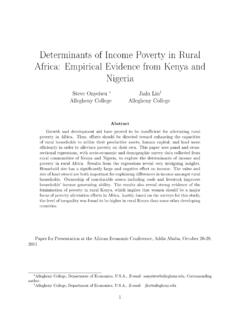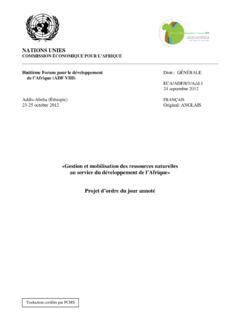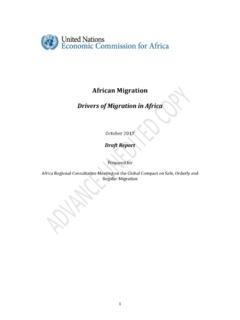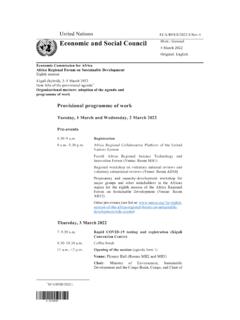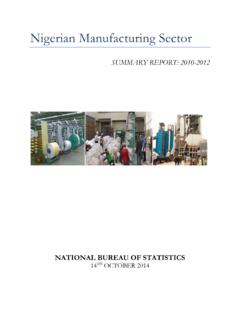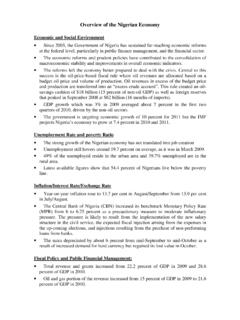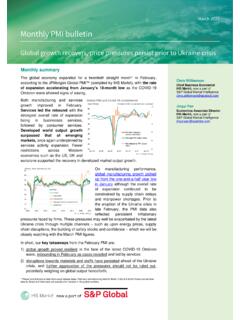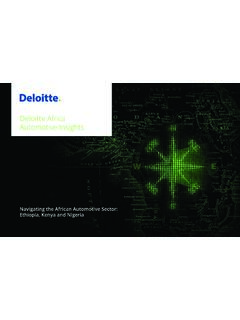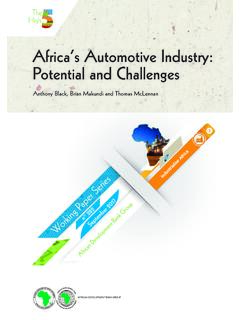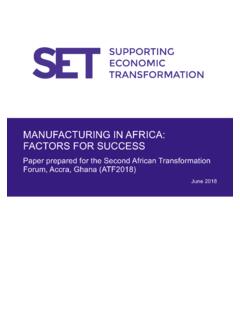Transcription of Estimating the Impact of COVID-19 on Small and Medium ...
1 Estimating the Impact of COVID-19 on Small and Medium Scale Enterprise: Evidence from nigeria Abioye Oyewale1, Ogunniyi Adebayo2, Olagunju Kehinde3. 1. International Institute of Tropical Agriculture (IITA), nigeria 2. International Food Policy Research Institute (IFPRI), nigeria 3. Economics Research Branch, Agri-Food and Biosciences Institute (AFBI), 18a Newforge Lane, Belfast BT9 5PX, UK. Abstract This paper examines the effect of COVID-19 related cases and lockdown measures on the issues related to Small and Medium Scale Enterprise in nigeria . Using an electronic data collection approach, this study analyzes the data using the linear probability model to estimate the effect of the pandemic on the entrepreneurs and model the factors influencing coping strategies using a multivariate probit model.
2 We found that majority of the entrepreneurs have been affected (both severely and slightly) by the COVID-19 pandemics through the partial and total lockdown and movement restrictions. We found that the COVID-19 pandemic's effect differs by sector of the economy (agriculture versus non-agriculture). For instance, partial lockdown measures had an increasing likelihood effect on low sales among the enterprises especially for the non-agricultural sector but there is a contrary result in the context of the food and agriculture sector . In addition, partial lockdown increases the likelihood of switching approaches of business (coping strategies).
3 Whereas total lockdown has a negative influence on the coping strategies. One of the policy implications of our study is the need to address social protection approaches (such as palliative measures) which can help to cushion the effect on the pandemic on the Small and Medium Scale Enterprise in nigeria . Introduction The coronavirus outbreak is ravaging human health, disrupting the livelihood of thousands of people, and Impact negatively on the global economy (Craven et al. 2020; Amare et al., 2020). Confirmed cases of the novel coronavirus named COVID-19 , which was first reported in December 2019 in the Chinese province of Hubei and declared a pandemic by the World Health Organization in March 2020 is now over 28 million worldwide, 1, 344, 403 in Africa, and 55,829 in nigeria as at September 2020.
4 The presence of the virus in nigeria was first reported on February 27, 2020, when an Italian citizen visiting nigeria tested positive for the virus, caused by SARS-CoV-2. On 9 March 2020, a second case of the virus was reported at Ewekoro, Ogun State, a Nigerian citizen who had contact with the Italian index case. The rapid spread of the COVID-19 virus led countries around the world into a health crisis. In addition to the human Impact , there are also substantial economic, business, and commercial impacts being felt globally. As viruses know no borders, the impacts will continue to spread (KPMG, 2020).
5 The study conducted by KPMG, (2020) has revealed that 94 percent of global and local businesses in nigeria have been impacted and are already seeing COVID-19 disruptions. Segal and Gerstel, (2020) forecasted in their study and suggested that there will be a deceleration of economic growth starting from March 2020 onwards without a precise ending date and some countries entering a recession. Seth et al., (2020) opined that Impact of the COVID-19 pandemic will have a likely severe Impact on Small and Medium scale enterprise. However, the channels and to what extent it will be is not clear and not evidence in the literature.
6 It is on this premise we intend to examine the Impact of the COVID-19 pandemic on micro-enterprises in nigeria , and to identify the coping strategies used by the entrepreneurs and also identify factors influencing coping strategies. We used a structured questionnaire using an electronic Medium (Survey Monkey) and targeted Corporate Affairs Commission's (CAC) registered and non-registered micro-businesses across nigeria . The online survey was shared via Email, WhatsApp, Twitter, LinkedIn, and other social networking and business platforms for micro-enterprises.
7 To the best of our knowledge, there is no data on COVID-19 Impact on registered and non-registered micro-enterprises in nigeria . therefore, there is no empirical evidence in this area of importance in nigeria economy. Therefore, the research questions guiding our thoughts are (i) what are the effect of the COVID- 19 pandemic on micro-enterprises in nigeria ? (ii) what are the factors influencing the coping strategies of the entrepreneurs in nigeria ? Hence, this study is timely and will provide insight on the Impact of COVID-19 on registered and non-registered micro-enterprises, identify their coping strategy, highlight the expected or available support from the government, and will assist the policymakers to know how best to support micro-enterprises post- COVID-19 .
8 The study is organized as follows: The next section reviews relevant literature on SME's business hurdles during pandemic outbreaks and survival strategies. Section 3 describes the research method. Section 4 presents the context, data collection, and descriptive statistics. Section 5. presents the findings of the study, and the final section concludes with suggestions for policymakers, industry, and future research. Context and literature review An Overview of nigeria Economy in the context of Micro, Small and Medium Enterprises In nigeria , there are 41, 543, 028 enterprises designated as Micro, Small and Medium Enterprises (MSMEs) accounting for , , and respectively with Lagos, Osun, and Oyo as the top states with the highest number of SMEs (NBS, 2017).
9 SMEs contribute 48% of national GDP, account for 96% of businesses, and 84% of employment. Micro-enterprises are Small businesses with less than 10 employees and have less than 5 million Naira in assets excluding lands and buildings. Unsurprisingly, a large majority of micro-businesses are sole proprietorships. SMEs, however, have more distributed ownerships with 65% as sole proprietorships, 21% as private limited liability companies, 6% as faith-based ownerships, and 5% as partnerships (NBS, 2017). With the larger number of enterprises in nigeria being a micro-enterprises, any business and economic shocks will unavoidably affect various sectors and livelihoods of many citizens.
10 As the world is currently being ravaged by the COVID-19 pandemic, nations are grappling with how to contain the spread and limit its effect within their borders (Obiakor, 2020). The government has used different measures to control the spread of the virus and these include the closure of airports, schools, market places, and worship centers among others. The closure by the Federal Government of nigeria started on 30 March 2020 with Federal Capital Territory, Lagos, and Ogun States having the first share being the first states with the COVID-19 cases in the country (Presidential Task Force on COVID-19 , 2020).
